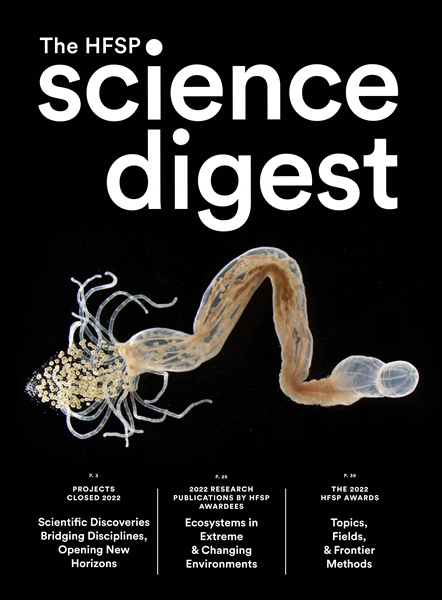The 64-page volume details extraordinary findings from HFSP-supported research; high-profile scientific papers that have resulted from these breakthrough discoveries; and newly awarded HFSP Research Grants and Fellowships. In total, this year’s Science Digest represents more than 90 projects, involving 123 international scientists from more than 23 countries.
“I am pleased to present this year’s Science Digest, which contains some of the world’s most impressive investigations conducted at the very horizons of life science inquiry,” said Pavel Kabat, HFSPO Secretary-General. “Basic research provides a vital foundation for human society by exploring whole new fields and disciplines from which innovative medical treatments, medications, and engineered solutions can emerge."
"As our planet Earth is undergoing rapid and dramatic change, increasingly global leaders – including the G7 earlier this year in Hiroshima – are calling for expanded basic research into how our planet’s systems respond to change, feedback loops that influence living organisms, and how communities of species interact under such stress,” said Kabat. “This requires, advanced, interdisciplinary research – and HFSPO is at the forefront supporting this inquiry.”
Thus, this edition of the Science Digest features a section entitled “Ecosystems in Extreme and Changing Environments: What They Teach Us and What We Need to Learn About Them.” Here readers will find research on how distinct species evolve in extreme environments, such as hydrothermal vents in the ocean, how closely related fungi may be more successful than distant cousins in sharing nutrients with trees in forest settings, and how our atmosphere itself may be Earth’s largest living ecosystem, and many more. These research approaches represent extraordinary, multi-dimensional explorations in the face of change.

The Science Digest is divided into three sections, Section 1 focuses on outstanding HFSP Research Grant and Fellowship projects that were completed in 2022. Section 2 includes a topical overview on exciting research in a broad area, and this year, that focus is on how organisms live in, and are shaped by, their environments, both commonplace scenarios and extreme settings. Section 3 presents summaries of the HFSP Research Grants and Fellowships awarded in 2022 that began work in 2023.
HFSP Research Grants prioritize international collaboration, particularly those projects that propose investigations involving researchers from more than two countries. About two-thirds of HFSP-funded projects involve teams in three or more countries, and almost all involve intercontinental collaboration. In this regard, HFSP creates networks that transcend national and disciplinary borders and establishes opportunities that go far beyond what would be possible through classical, bilateral collaborations.
HFSP postdoctoral opportunities, both Long-Term Fellowships and Cross-Disciplinary Fellowships, enable early career scientists to move to a new country and experience new research environments and fields. Specific effort is made to encourage and support early career scientists from disciplines outside the life sciences to embark on a career path in the life sciences through cross-disciplinary research. This is yet another way HFSP is opening new horizons and exploring new frontiers.
Indeed, HFSP provides a unique forum for scientists to enter international collaborations in life science research, and at times in their careers, that go beyond what most science funding mechanisms support.


































